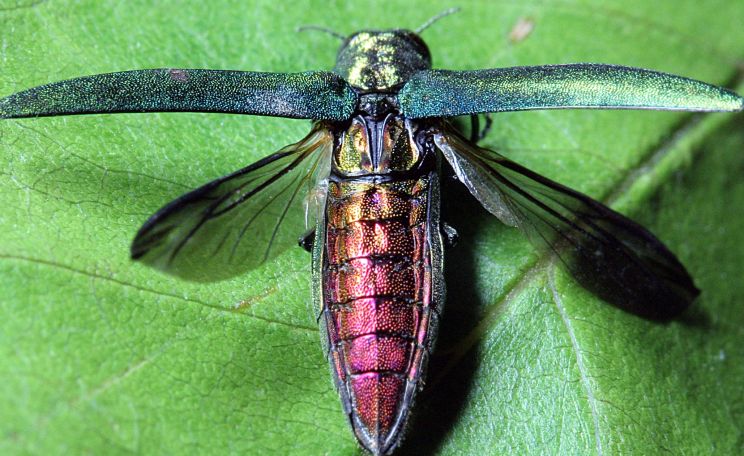Over a quarter of pesticides used in the US are banned by the European Union.
Labelling can be controversial when it comes to pesticides. Most are considered safe based on how they are used, but there is insufficient evidence on safe exposure levels.
Research into pesticides' effects on human health is still relatively new. They were not available commercially until after World War II, and before that, all food was grown organically.
While many scientists, environmentalists and consumers agree that pesticides harm the environment, it is trickier to analyze their impact on health.
Settlements
Glyphosate is arguably the best-known agricultural chemical on the market. It's the most widely used herbicide in the world and is the main ingredient in the commercial product Roundup.
Roundup is the best-selling product of Monsanto, an agricultural corporation with a huge impact on US farming. In 2016, the pharmaceutical company Bayer acquired Monsanto to expand crop science research.
Shortly after the acquisition, Bayer-Monsanto settled a $289 million case involving a school groundskeeper who got non-Hodgkin's lymphoma after using Roundup.
Before the merger, Monsanto lost multiple highly publicized cases in which the plaintiffs claimed Roundup caused their cancers. These lawsuits marked the beginning of legals battle over the possible toxicity of glyphosate. On June 24, 2020, Bayer agreed to pay $10 billion to settle more than 125,000 lawsuits with similar claims.
Over a quarter of pesticides used in the US are banned by the European Union.
Including cancer warnings for pesticide products may be a decisive factor future lawsuits. However, there is still more research to be done on how certain pesticides harm human health and what exposure levels are safe.
Risk
According to the Californian chemical regulation legislation Proposition 65, "no significant risk" in product labelling is no more than one extra reported case per 100,000 people over a 75-year lifetime. Roundup has only been used in commercial agriculture since 1974, making it difficult to examine the long-term effects of exposure. Most other commercial pesticides are also relatively new, making it difficult to study long-term health impacts.
The tricky part about pesticide labelling is that the EPA is responsible for reporting on public health issues as long as the product is used "in accordance with its current label". In other words, pesticides are safe if you spray them on crops and do not come in contact with them.
Unfortunately, much of this is subject to interpretation, considering that the majority of the US food supply is sprayed with glyphosate. This discrepancy has not gone unnoticed. According to the Environmental Sciences Europe journal, there is some controversy over how Bayer and the US government are analyzing exposure levels.
The results of research into glyphosate being a carcinogen will depend on how those studies are performed. In 2019, the University of Washington published a report stating that glyphosate increased the risk of some cancers, including non-Hodgkin's lymphoma, by more than 40 percent. However, there is also significant evidence that glyphosate is not directly a carcinogen, but has a lethal impact on the immune system, specifically on beneficial gut bacteria.
If this hypothesis is true, it would add support to the claims of those who developed non-Hodgkin's lymphoma. However, to determine the true effect, studies will need to detail the detriments of glyphosate over a long period of exposure. In addition to detrimental impacts on the immune system, scientific studies also suggest glyphosate is most likely an endocrine disruptor, meaning it can cause congenital disabilities and reproductive disorders.
Exposure
In 2017, Proposition 65 identified glyphosate as a "probable human carcinogen" based on studies by the International Agency for Research on Cancer (IARC). This concluded animals exposed to glyphosate developed tumors at higher rates.
The IARC is a branch of the United Nations World Health Organization, and the inclusion of the cancer warning label does not ban or discourage the use of pesticides. It simply is a right-to-know label for the consumer. However, including cancer warnings on pesticides requires a clearer definition of exposure.
The controversy surrounding the labeling of pesticides is ongoing. There is continuing disagreement on the toxicity of glyphosate and its effects on human health. In 2019, the EPA announced in a letter that the cancer labelling for glyphosate-containing products is "misleading." The variability in exposure makes it tricky to determine the true impact.
This complication is reflected in the dilemma within the EPA when it comes to labeling pesticides. The department that handles pesticide labeling, the Office of Pesticide Programs (OPP), stated that the pesticide warning that glyphosate is "probably carcinogenic to humans" may violate the Federal Insecticide, Fungicide and Rodenticide Act (FIFRA). Because pesticides are labeled according to their use, the safety warnings may be irrelevant depending on exposure levels.
The US stance on pesticides has long been considered more lenient than other developed countries. In fact, over a quarter of pesticides used in the US are banned by the European Union. Whether or not cancer and pesticide warnings are included on pesticide products, it will most likely be a while before the true human health impacts of pesticides are discovered.
This Author
Emily Folk is a conservation and sustainability writer and the editor of Conservation Folks.







